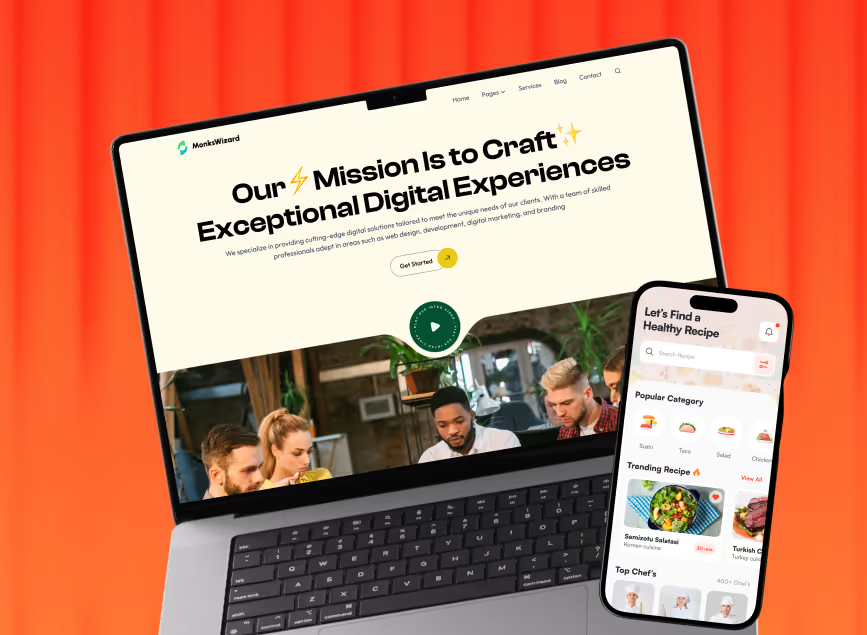
Key Takeaways
- Mental health apps require empathetic, intuitive designs to build user trust.
- UI Kits save time while maintaining consistency across app screens and components.
- Customizable kits allow personalization for diverse user needs and experiences.
- AI-ready kits enable features like chatbots, journaling, and progress tracking.
- Choosing the right kit ensures efficiency, emotional support, and smooth user journeys.
Creating a mental health app requires more than attractive visuals; it needs to create trust and comfort. The design must guide users gently and intuitively through their journey toward well-being.
A well-designed UI Kit plays an important role in achieving this. It provides ready-made components and layouts designed specifically for mental health apps. The aim is to make the process faster and ensure a consistent, empathetic user experience.
However, in this blog, we explore some of the top mental health app UI kits you can use. Check out their features and benefits to choose the best foundation for your next project.
What’s an App UI Kit?
An App UI Kit is a pre-made collection of user interface elements, screens, and components. This kit usually helps designers and developers build mobile apps faster and more consistently.

Generally, UI kits include things like buttons, navigation bars, input fields, icons, and complete screen layouts. They’re built using design tools like Figma, Sketch, or Adobe XD.
UI Kits significantly save time by providing ready-made, editable templates that can be customized to fit a specific app’s needs. Instead of designing every element from scratch, teams can focus on improving user flow and functionality.
They’re especially useful for startups, product designers, or agencies working on tight timelines who still want a polished, professional look in their apps.
Importance of Using an App UI Kit for a Mental Health Product
Designing for mental health doesn’t mean that you can stop fixing the visuals. You must create a space where users feel safe, supported, and heard. In such sensitive domains, clarity, empathy, and consistency in design play a huge role. That’s where a UI Kit becomes not just helpful, but essential.

Consistency Builds Trust
UI Kits offer a unified design language for all screens to help users feel more comfortable as they move through the app. For mental health tools, this consistency reinforces reliability.
Faster Design Process
With ready-to-use components and layouts, teams can focus on core functionality and user needs instead of reinventing basic design elements. So, they can work faster.
Empathy by Design
Mental health UI Kits are often built with soft colors, calming visuals, and intuitive flows. These features usually reduce friction by creating a more supportive experience for users in distress.
Easy Customization
Most UI Kits are highly customizable. They let teams adjust elements without losing structure. This flexibility is pretty important when personalizing experiences for diverse user needs.
Cost-Effective Solution
Especially for startups or small teams, UI Kits help reduce design and development time. They offer more resources to be directed toward therapy content, AI integration, or expert support features.
Accessibility Ready
Many UI Kits are built with accessibility in mind, ensuring better readability, contrast, and interaction—critical for users with mental health challenges.
Top Features to Look for in a Mental Health App UI Kit
Choosing the right UI kit is crucial for building an engaging and user-friendly mental health app. Here are the top features that can help ensure your app supports wellness effectively.
Pre-Built Screens for Key Mental Health Functions
A quality UI kit should include ready-made screens for meditation, journaling, mood tracking, therapy sessions, and sleep support. These screens save design time and ensure consistency in UX in a mental wellness app.
Modular and Customizable Components
User interface elements for easy use in mental health apps, like UI button designs, cards, forms, and icons, should be modular and easy to customize. This flexibility allows designers to maintain brand identity while quickly adjusting layouts for different app requirements.
Responsive Design and Auto Layout
Look for kits built with responsive design principles and auto-layout features. These ensure the app adapts to multiple screen sizes and devices, maintaining usability and a clean, consistent interface.
Theme and Color Variations
UI kits with light, dark, or multiple theme options provide flexibility to create a soothing experience for users. Adjustable themes help improve accessibility and meet user preferences for visual comfort.
Wellness-Focused Illustrations and Icons
Icons and illustrations supporting mindfulness, meditation, therapy, and mental wellness enhance user engagement. Thoughtful visuals create a calm, empathetic interface that aligns with mental health goals.
Organized Layers and Style Guides
Well-structured layers, naming conventions, and included style guides make it easier for teams to collaborate. Designers can quickly find components, maintain consistency, and speed up the design-to-development workflow.
Best Mental Health App UI Kit
Now, let’s come to the point and learn about 3 best mental health app UI kits. I’ve chosen 3 options with the most features and better flexibility. You can check the features and choose the most suitable one for you.
1. AI Mental Health Mobile App UI Kit by Design Monks
Design Monks offers a powerful UI Kit personalized for AI-driven mental health apps. With 70+ screens and a clean, modern design, it’s built for teams that want to launch fast without compromising on quality or empathy.

This kit is perfect for startups, therapists, and developers who build wellness apps or digital therapy platforms. It offers user-friendly flows and thoughtful visuals that support mental well-being through calm and intuitive design.
Built entirely in Figma, it includes responsive layouts, organized layers, and free fonts. Whether you’re customizing or collaborating with a team, this kit keeps your workflow smooth and efficient.
Key Features
- 70+ high-quality, ready-to-use screens.
- 80+ modular, customizable components.
- 300+ icons and wellness illustrations.
- Responsive design with Figma Autolayout.
- Clean, calming UI focused on mental health.
- Easy to edit and integrate into projects.
2. Mindify: AI Mental Health App UI Kit
Mindify is a feature-rich UI kit designed for building full-fledged AI mental health apps. With a vast library of 275+ screens, it covers lots of wellness features like journaling, sleep support, meditation, and personalized coaching. They are all created in a modern, trendy style.

This kit is suitable for designers and teams who need an extensive design system and flexibility for iOS and Android. It comes packed with Figma variables and components, enabling fast theme switching and simplified design updates across the project.
While Mindify is highly customizable and responsive thanks to its full use of Figma’s Auto Layout and Variables, it might feel complex for beginners. Still, for experienced designers building powerful mental wellness platforms, it may provide a nice groundwork.
Key Features
- 275+ screens for mental health and wellness use cases.
- 465+ Figma variables with light/dark and dual theme support.
- 1115+ components and variants with the integrated design system.
- Full auto-layout for responsive design editing.
- Includes mood tracking, chatbot, meditation, journaling, and gamified experiences.
- Organized layers, pixel-perfect layout, and extensive style guides.
3. Health Track: Medical App UI Kit
Health Track is a clean and practical UI kit built for modern healthcare apps. With 60+ mobile screens, it focuses on core medical features like booking appointments, managing records, and accessing specialty care. And you’ll get in a straightforward and patient-friendly layout.

This kit is a good match for developers and product teams looking to build general-purpose medical apps. The structure supports common health functions, including user profiles, pharmacy locators, and integrated payments.
Though it offers fewer screens and components than more advanced kits, its simplicity makes it a solid choice for quick healthcare MVPs or niche wellness solutions with basic needs.
Key Features
- 60+ screens covering essential medical functions.
- Clean, accessible design for easy navigation.
- Appointment scheduling and doctor specialty search.
- Profile and health record management.
- Built-in pharmacy locator with map integration.
- Payment system for service checkout.
Which One is the Best Mental Health App UI Kit?
When it comes to designing a mental health mobile app that’s smart, empathetic, and user-first, choosing the right health app UI kit matters. Among the three options, which are Design Monks’ AI Mental Health UI Kit, Mindify, and Health Track, each brings something valuable to the table.
However, if you're looking for a balance of functionality, modern design, and user-focused details, Design Monks' UI Kit stands out as the top choice.
Here’s why:
Depth and Flexibility
With 70+ screens, 80+ components, and 300+ icons and illustrations, the kit provides a complete design foundation, without overwhelming complexity. The other kits’ foundation may seem a little bit complex, especially for beginners.
AI-Ready Design
This kit is built specifically for AI-based mental health solutions. Indeed, it's ideal for creating chatbots, progress tracking, and personalized experiences from the ground up.
User-Centered Approach
Every screen of this Figma Mental Health UI Kit by Design Monks is created to support emotional well-being. It also comes with intuitive layouts that make the user journey smooth and comforting, unlike its competitors.
Smart Structure
The use of Figma’s auto-layout and clean component setup makes the UX/UI Kit for Wellness App extremely easy to customize. It’s also very effective to scale across different projects.
Even though Mindify and Health Track are solid choices for more general or feature-heavy apps, Design Monks’ kit hits hardest. This mental wellness app UI kit creates a perfect balance for real-world mental wellness solutions.
Tips for Customizing Mental Health UI Kits
Customizing a mental health UI kit ensures your app stands out while meeting users’ wellness needs. Here are practical tips to adapt any kit to your project efficiently.
Maintain a Calm and Consistent Color Palette
Choose soft, neutral, or pastel colors that promote relaxation. Consistency across screens strengthens brand identity and creates a soothing experience. Always ensure health app interface colors align with mental wellness principles.
Adapt Pre-Built Screens to Your App Needs
Modify screens in the medical UI kits or mental health UI kits to suit your specific app functions. Adjust layouts for meditation, journaling, or therapy modules while keeping the user journey intuitive.
Customize Typography for Readability
Select fonts that are easy to read on small and large screens. Maintain hierarchy for headings, body text, and buttons, enhancing accessibility and ensuring your health app interface is user-friendly.
Personalize Illustrations and Icons
Replace generic graphics with illustrations that reflect your brand style. Use wellness-focused icons to support activities like breathing exercises, sleep tracking, or mindfulness, improving engagement across the medical ui kits.
Utilize Auto Layout and Components
Take advantage of modular components and auto-layout features in Figma or Sketch. This flexibility allows you to adjust spacing, resize elements, and update the health app interface efficiently without breaking the design system.
Optimize for Accessibility
Ensure your UI kit follows accessibility best practices, including sufficient color contrast, readable font sizes, and intuitive navigation. A well-adapted medical ui kit design supports all users, including those with visual or cognitive challenges.
Test and Iterate Based on Feedback
After customization, test your health app interface with real users or teams. Collect feedback on usability, visuals, and workflows, then refine screens and components to enhance the app’s effectiveness and user satisfaction.
End Note
Choosing the right Mental Health App UI Kit can make a significant difference in creating an effective and user-friendly app. The right kit ensures your design is both efficient and empathetic that can successfully help users feel supported throughout their experience.
So, explore the options carefully and focus on features that match your project’s goals. With the right foundation, you can build a mental health app that truly makes a positive impact.

.svg)






.avif)
.avif)
.avif)
.avif)


.avif)
.avif)
.avif)
.avif)








.avif)






